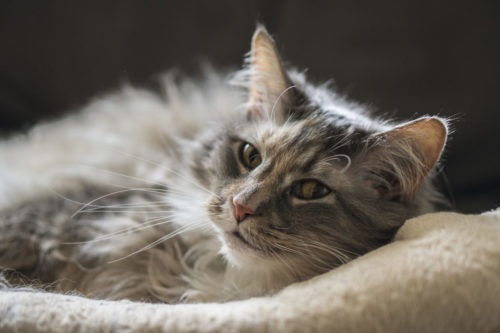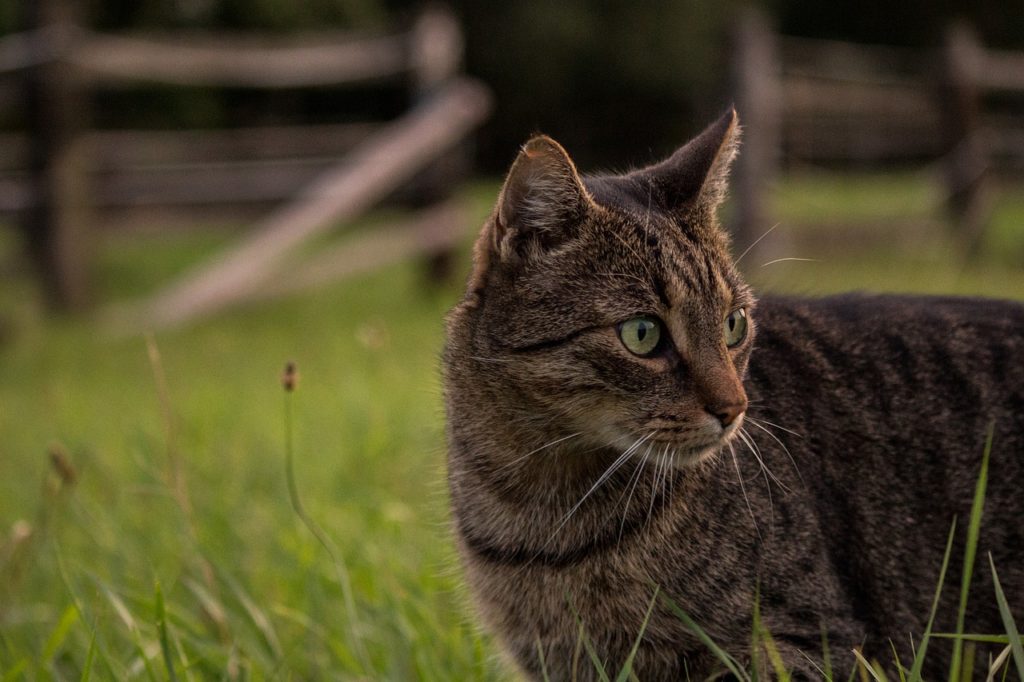When your furry feline appears to be sick, the first thing you want to do is to help. Unfortunately, since we are unable to directly communicate with our cats, we have to pay close attention to other behavioral changes or symptoms that might be pointing to sickness. A common symptom that cats will exhibit if they are feeling ill is diarrhea.
Whether it’s a stomach bug or some type of disease, a cat with diarrhea can be a sign of endless health issues. That’s why it can be so difficult to identify the primary cause of feline diarrhea right off the bat. While one or two episodes shouldn’t raise major concern, if his problem becomes persistent or is accompanied by other symptoms, that’s when it’s time to seek professional help.
Since there are so many illnesses and health issues that have diarrhea as one of its many side effects, sometimes a vet is needed just to rule out the more life-threatening conditions like feline kidney disease or intestinal parasites like tritrichomonas foetus. It is always better to be safe than sorry when is comes to having a cat with diarrhea, especially when it comes to your loving companions. In order to keep your cat as healthy as possible, make sure to take them to the vet for their annual check-ups or whenever they are showing unusual symptoms.
If your cat is suffering from feline diarrhea and you don’t know how to manage, continue reading this article below. This article will cover all the basics of what may be causing your cat to have diarrhea and how to deal with the situation. Being an educated pet owner and being aware of their overall health is the best way you can provide your cat with a long and healthy life.
What is Diarrhea in Cats?
Diarrhea is known as a loose or liquid stool. It can also be characterized by an increased frequency of bowel movements. When a cat is suffering from diarrhea, their digestive system rapidly moves food and other digested material through their body, causing the typical signs of diarrhea to occur. This condition can either be brought on by something that your cat has consumed or something more serious like an infection or chronic illness like a kidney disease.
Depending on the cat, their diarrhea can either be one or two occasions or be continuous for days. If your cat is experiencing diarrhea for more than a day, that usually means it’s time to be checked out by a veterinarian. Dehydration can quickly set in if a cat has been suffering from diarrhea for an increased period of time. Regardless how severe your cat’s symptom is, make sure to provide them with a fresh bowl of water and encourage drinking as much as possible. Another diarrhea treatment is to find some probiotics for cats. Probiotics for cats will help treat your cats digestive tract to get their stool and bowel movements back to normal.
What Are the Main Causes of Diarrhea in Cats?
As said before, the possible causes of diarrhea in cats are endless. Diarrhea is one of the most common symptoms that surface when a cat is suffering from an underlying health issue. This section will cover the most common causes of diarrhea in cats.
Causes of Diarrhea in Cats
- Change in Diet
- Parasites
- Infection
- Allergic Reaction
- Kidney disease
- Tritrichomonas foetus
- Feline panleukopenia
Change in Diet
Starting off with the least severe, a simple change in diet can cause your cat to suffer from digestive issues. Cats are known to be quite picky eaters, however, that doesn’t mean they never get into things they shouldn’t. If a cat consumes too much grass or any type of foreign object, that may be the cause of their digestive problems.
Cats can even experience this unfortunate symptom just by having a change in their everyday food diet as well. Switching from wet to dry food or vice versa can upset your kitty’s sensitive tummy. If your cat is experiencing these side effects from a change in diet, go back to the old product or slowly add the new product in.
Parasites
Gastrointestinal parasites like from the protozoan parasite giardia is a likely cause of diarrhea in cats. Our pets can acquire parasites directly or indirectly but are usually ingested through feces from an infected cat. Once an animal has been infected with this parasite, the most common symptom they will show is diarrhea. If you believe your cat is suffering from this kind of parasite, take him to the vet for further analysis. From there, your vet will be able to run several tests and rule out all other possible causes. Once they determine the exact type of parasite, they will then prescribe medication or another outpatient treatment plan.
Infection
Both bacterial and viral infections can cause your cat to experience diarrhea. All it takes is a cat to come into contact with a harmful bacteria or virus for them to get sick. Generally, if a cat has an infection, they will also show other accompanying symptoms like a fever, vomiting, lack of appetite, or skin inflammation. Luckily, once a vet diagnoses the cat, they can be prescribed an antibiotic, topical treatment, or pain reliever medication depending on their condition and type of infection.
Allergic Reaction
Allergic reactions are usually the result when the immune system becomes overly sensitive to environmental factors. Just like in humans, cats can have food allergies to different products or ingredients that are commonly found in their cat food. If their allergy is not from something that is consumed, it can also be caused by pollen, plants, mold, perfumes, prescription medications, or even household cleaning products.
If you assume your cat is allergic to something in their environment, take them to the vet to determine the underlying cause. Your vet will start the examination process with a complete physical test followed by blood work. If they assume that your cat’s allergy is caused by something in their diet, they may recommend changing up their daily food intake to see if their symptoms lessen. Once the underlying cause has been uncovered, you will need to eliminate the allergen from your cat’s environment.
Stress
Although your cat may seem happy and go-lucky, their emotional stability might not be as perfect as it seems. In fact, cats can develop phobias or feline anxieties just like their human counterparts. Cats can feel anxiety by minor changes in their environment, if they move to a new location, or if a new pet is brought into the home.
Other common symptoms of stress in cats include excessive grooming, excessive scratching, urinating outside the litter box, diarrhea, excessive vocalizations, and a loss of appetite. The best way to calm your kitty’s nerves is to make them feel relaxed. Talk to your vet or other pet behavior professional for techniques on how to deal with a stressed-out feline.
Inflammatory Bowel Disease
Inflammatory Bowel Disease in cats is a group of gastrointestinal disorders. These issues restrict the intestine’s ability to function how it should. Aside from vomiting, cats with IBD will also experience vomiting, lethargy, and weight loss. Although there are a few believed causes, most cases are diagnosed as idiopathic. Your vet will be able to conduct tests and examinations to diagnose IBD and prescribe a specific treatment regimen for your cat to follow.
Medications
Some medications can be too strong for a cat’s digestive system, causing them to vomit or suffer from diarrhea. Most of the time antibiotics are to blame for these side effects. That’s why it is critical to pay close attention to your cat’s overall health and behavior while they are recovering from an illness. If your cat is experiencing adverse side effects from medication, call your vet immediately. They should not continue taking the drug if they are suffering from any type of negative health issues.
Cancer or Tumors in the Digestive Tract
Although not as common, cats can suffer from various cancers or invasive tumors within the gastrointestinal tract that can lead to diarrhea. If this is the case, your cat will likely experience diarrhea off and on for an extended period of time and show several other symptoms. Cat cancers and tumors are more severe conditions that will need medical assistance right away for a positive prognosis.
How to Manage Diarrhea in Cats
As you can see, there are endless causes of diarrhea in cats, which is why it’s important to take your cat to the vet for further testing. As discussed earlier, some possible causes are quite simple to treat once the cat has received a proper diagnosis. The best thing you can do for your furry companion is to be proactive and seek professional attention as soon as symptoms begin to worsen. Once you are at the vet, make sure to inform them of all other problems or changes in behavior that are present in your cat.
If your cat’s diarrhea is persistent, try withholding their food for 12 to 24 hours, especially if vomiting is also present. During this time, make sure to keep them hydrated by providing them with fresh water. This is a very critical component of the treatment process since dehydration is likely to occur. After restricting their food intake and their issue has not gotten any better, your vet will need to see them for further testing. This is also the case if their diarrhea is accompanied by lethargy, loss of appetite, or vomiting.
At the end of the day, you need to use your best judgment when deciding if your cat is truly sick or not. Usually, when other symptoms are also present along with their vomiting, that means that your cat is suffering from a more severe internal issue. Your vet is there to guide you and support you while owning a pet so do not feel the slightest bit hesitant to take your cat in if they appear to be sick.
Another important sign that your cat requires professional help is if they have blood in their diarrhea. This can be pointing to a severe internal health condition that needs immediate attention. Your cat should also be taken in immediately if their diarrhea is dark or tarry in appearance. Any unusual characteristics should be checked out by a vet.
If your cat’s diarrhea is due to their sensitive digestive system, talk to your vet about possible probiotic supplements to add to your cat’s diet. Probiotics can help regulate your cat’s gut and strengthen their tolerance to ingredients in cat food.
Diagnosing Diarrhea in Cats
Diagnosing a cat with diarrhea is quite simple since you will be able to spot it first hand. The challenging part is finding out what is causing the underlying issue. Once you bring your cat to the vet, they will first start off their diagnoses process by conducting a physical exam and a blood test. They may even do a fecal or urine test if they believe the issue is caused by a parasite or infection. Depending on the cause your vet assumes, they may also need to run further testing including a biopsy, radiographs, ultrasounds, or cultures. Factoring in your cat’s condition and overall state of health, your vet will run whatever tests they deem to be necessary.
Wrapping Up
As we have already discussed, not all cases of diarrhea deem a trip to the veterinarian right away. Some minor cases will fix itself on its own within the first day or two, which usually just means that your cat just had an upset stomach. Since there are so many possible causes of diarrhea, it can be extremely difficult to figure out their problem on your own. Unless you physically watched them eat food that they shouldn’t have or their symptoms occurred as soon as you changed their diet, you will need professional assistance to identify their issue.
As soon as they begin to have diarrhea, encourage them to drink as much water as possible to avoid dehydration, especially in cases where the cat is very young or old. If your cat’s diarrhea has not gotten any better within a day or two and other symptoms are present, make an appointment with your vet right away. They will be able to properly diagnose your furry companion after a thorough health examination and specific testing. Once your medication has been prescribed or a treatment plan is in place, follow your vet’s instructions carefully for a safe and fast recovery.




